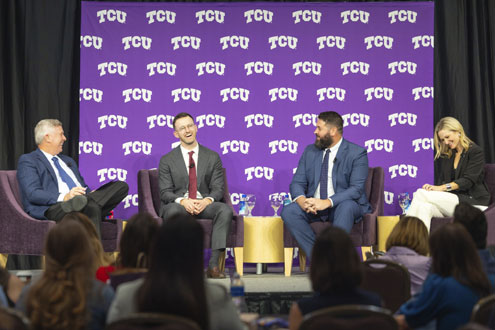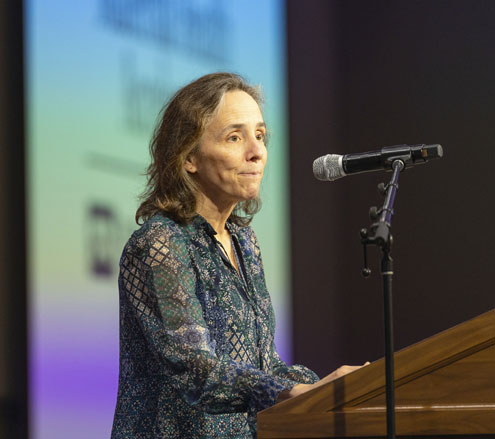Innovative program led by TCU and UT Southwestern aims to reduce the rate of severe obstetric complications.
Fort Worth, Texas -- The Anne Burnett Marion School of Medicine at Texas Christian University and UT Southwestern Medical Center have joined forces to address some of the highest maternal morbidity rates in the country by forming the North Texas Maternal Health Accelerator (MHA).
“At the Burnett School of Medicine, we are deeply committed to improving health care access and outcomes for all Texans. We recognize the immense value of this initiative in fostering sustainable, systemic change in maternal health care delivery,” said Stuart D. Flynn, M.D., the Founding Dean of the Burnett School of Medicine at TCU. “This truly is a great example of collaboration, where Texans are coming together to help Texas and the entire country.”
Fort Worth Mayor Mattie Parker, who helped form this coalition, is one of the MHA’s many government partners, who include leaders at the local, county, state, and federal level. Coordination with agencies and elected leaders has already mobilized millions of dollars in additional public funding that supports the MHA’s objective to enhance maternal health care across Texas and the country.

The program, led by Dr. Flynn as PI with UT Southwestern and Parkland Health as co-investigators, will be coordinated by the nonprofit Child Poverty Action Lab (CPAL) based in Dallas. My Health My Resources of Tarrant County (MHMR), and Parkland Center for Clinical Innovation (PCCI) serve as key partners.
The MHA’s dual goals are to (1) reduce severe obstetric complications (SOCs) by more than 20% over three years through implementation of novel technologies and strategies, and (2) to develop economic models that reward maternal health improvements via sustainable incentives for keeping mothers and babies healthy.
“We are honored and proud of the many partnerships that make this innovative program possible,” said David Nelson, M.D., Division Chief of Maternal-Fetal Medicine at UT Southwestern Medical Center. “The foundation of the clinical program is built using evidence-based strategies from health care experts who are a part of this talented team. The future of maternal health care across the United States starts today in North Texas.”

Since December 2024, 11 philanthropic partners across North Texas have committed nearly $25 million to support the MHA’s maternal health initiatives.
In addition to TCU and UT Southwestern, area hospitals from every major health system in North Texas, including Baylor Scott & White, JPS Health Network, Texas Health Resources, Medical City Healthcare, and Methodist Health System, have committed to this work with the shared goals of reducing maternal morbidity and deaths. More than 50 other partners, including MHMR, PCCI, Best Place for Kids, The University of Texas at Arlington, Catholic Charities Fort Worth, Catholic Charities Dallas, and Delighted to Doula, along with more than 60 healthcare clinics, managed care organizations, and a host of other partners throughout the North Texas region are engaged in this novel health program.
“Advancing new models for maternal health at a regional scale requires an up-front investment in infrastructure that unites dozens of providers and community partners around a shared vision,” said Alan Cohen, Founder & CEO of CPAL. “We have the opportunity to improve outcomes for mothers and babies in North Texas and demonstrate a replicable approach to delivering care in ways that also reduce costs.”
MHA’s first initiative, launched in spring 2025, addresses the area’s most common severe obstetric complication: blood transfusions. Free, over-the-counter iron supplements are already being distributed to pregnant mothers across Tarrant and Dallas counties to reduce their risk of needing a blood transfusion after delivery. This intervention is based on research from UT Southwestern and Parkland Health that showed about a one-third decrease in blood transfusions among patients who were given prenatal iron supplements from their health care provider, rather than being recommended to take the once-a-day pills.
“We can make a large impact on our patients’ health and outcomes by implementing simple interventions,” said Catherine Spong, M.D., Professor of Obstetrics and Gynecology at UT Southwestern, who co-led the study, which also included Dr. Nelson. “This study demonstrates the efficacy of a public health initiative to reduce maternal anemia and the most common cause of severe maternal morbidity and gives other institutions data to implement similar programs in their own populations.”

The iron supplement distribution began at John Peter Smith Family Health Center in Fort Worth and has expanded to 16 different community clinic partners across 60 North Texas sites.
The research program traces its origins to the Tarrant County Maternal & Infant Health Coalition (MIHC) started by Mayor Parker in September 2022 to find solutions to the city’s critical maternal and infant health outcomes. Fort Worth’s 76104 ZIP code had one of the highest infant mortality rates of any ZIP code in the United States with 19 infant deaths per 1,000 live births between 2011 and 2014, according to Tarrant County Public Health. The average U.S. infant mortality rate is 5.61 deaths per 1,000 live births.
“I believe the way we care for mothers and children in Fort Worth is a true measure of our city’s success,” Mayor Parker said. “When I first convened the Maternal & Infant Health Coalition in 2022, Fort Worth and Tarrant County already had exceptional medical providers and resources – but we lacked the coordination needed to truly improve outcomes for mothers and babies. This project and its funding will enhance that collaboration and create real impact in our region for years to come.”

About the Burnett School of Medicine at TCU
The Anne Burnett Marion School of Medicine at Texas Christian University opened in July 2019 in Fort Worth, Texas, to transform health care by inspiring Empathetic Scholars®. The allopathic (M.D. granting) medical school was fully accredited by the Liaison Committee on Medical Education (LCME) in 2023. The innovative curriculum includes an emphasis on compassionate patient care, a four-year Longitudinal Integrated Clerkship, and a four-year Scholarly Pursuit and Thesis research project. Preparing students for the way medicine will be practiced in the future, the Burnett School of Medicine focuses on future advances, while keeping the patient the center of care.
About UT Southwestern Medical Center
UT Southwestern, one of the nation’s premier academic medical centers, integrates pioneering biomedical research with exceptional clinical care and education. The institution’s faculty members have received six Nobel Prizes and include 24 members of the National Academy of Sciences, 25 members of the National Academy of Medicine, and 13 Howard Hughes Medical Institute Investigators. The full-time faculty of more than 3,200 is responsible for groundbreaking medical advances and is committed to translating science-driven research quickly to new clinical treatments. UT Southwestern physicians provide care in more than 80 specialties to more than 140,000 hospitalized patients, more than 360,000 emergency room cases, and oversee nearly 5.1 million outpatient visits a year.
About the Child Poverty Action Lab (CPAL)
The Child Poverty Action Lab (CPAL) operates as an unofficial R&D department for Dallas, rethinking how data can be integrated into public systems, community programs, and neighborhood life to break cycles of intergenerational poverty. One of CPAL’s initiatives increases North Texas’ capacity to compete for and secure meaningful federal grants, unlocking resources to drive local impact.


